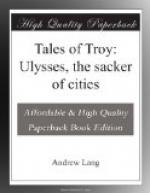Then Hector went to see his dear wife, Andromache, whose father had been slain by Achilles early in the siege, and he found her and her nurse carrying her little boy, Hector’s son, and like a star upon her bosom lay his beautiful and shining golden head. Now, while Helen urged Paris to go into the fight, Andromache prayed Hector to stay with her in the town, and fight no more lest he should be slain and leave her a widow, and the boy an orphan, with none to protect him. The army she said, should come back within the walls, where they had so long been safe, not fight in the open plain. But Hector answered that he would never shrink from battle, “yet I know this in my heart, the day shall come for holy Troy to be laid low, and Priam and the people of Priam. But this and my own death do not trouble me so much as the thought of you, when you shall be carried as a slave to Greece, to spin at another woman’s bidding, and bear water from a Grecian well. May the heaped up earth of my tomb cover me ere I hear thy cries and the tale of thy captivity.”
Then Hector stretched out his hands to his little boy, but the child was afraid when he saw the great glittering helmet of his father and the nodding horsehair crest. So Hector laid his helmet on the ground and dandled the child in his arms, and tried to comfort his wife, and said good-bye for the last time, for he never came back to Troy alive. He went on his way back to the battle, and Paris went with him, in glorious armour, and soon they were slaying the princes of the Greeks.
The battle raged till nightfall, and in the night the Greeks and Trojans burned their dead; and the Greeks made a trench and wall round their camp, which they needed for safety now that the Trojans came from their town and fought in the open plain.
Next day the Trojans were so successful that they did not retreat behind their walls at night, but lit great fires on the plain: a thousand fires, with fifty men taking supper round each of them, and drinking their wine to the music of flutes. But the Greeks were much discouraged, and Agamemnon called the whole army together, and proposed that they should launch their ships in the night and sail away home. Then Diomede stood up, and said: “You called me a coward lately. You are the coward! Sail away if you are afraid to remain here, but all the rest of us will fight till we take Troy town.”
Then all shouted in praise of Diomede, and Nestor advised them to send five hundred young men, under his own son, Thrasymedes, to watch the Trojans, and guard the new wall and the ditch, in case the Trojans attacked them in the darkness. Next Nestor counselled Agamemnon to send Ulysses and Aias to Achilles, and promise to give back Briseis, and rich presents of gold, and beg pardon for his insolence. If Achilles would be friends again with Agamemnon, and fight as he used to fight, the Trojans would soon be driven back into the town.




